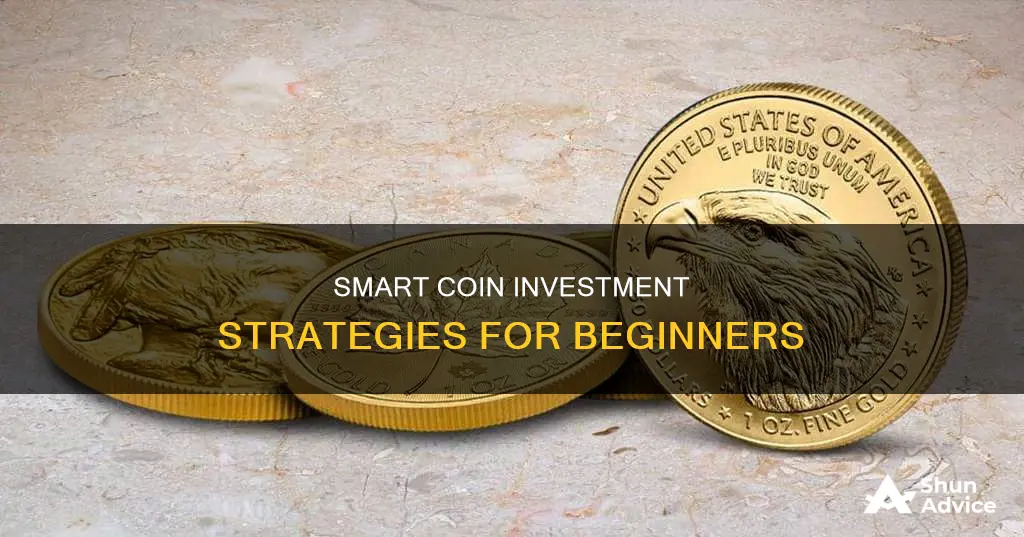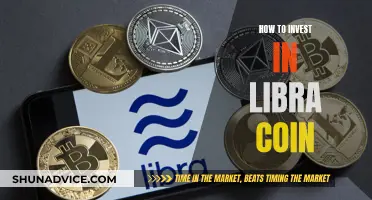
Investing in rare coins is a great way to diversify your portfolio and reduce risk. Rare coins are considered a commodity-like investment, where there may be sentimental value, but they can also produce attractive financial returns.
The popularity of investing in rare coins has grown over the last five centuries, thanks to the internet, which has allowed for the exponential growth of knowledge, resources, and grading information.
If you're thinking of investing in rare coins, it's important to do your research first and only invest what you can afford to lose.
| Characteristics | Values |
|---|---|
| Why invest in coins? | Diversification of investment portfolio, personal interest, historical interest, accessibility, stable value |
| Types of coins | Numismatic, bullion |
| Numismatic vs. bullion | Numismatic coins are older and made from different types of components and metals, giving them a lower melt value than bullion |
| Who buys rare coins? | Anyone interested in owning a tangible piece of history |
| How to start investing in coins | Study the market, choose a specific era, start with a small investment, scrutinise each addition, recognise different coin grades |
| Risks | Subjectivity in grading, fraud, fluctuation of market value |
What You'll Learn

Coins as Bullion vs Numismatics
When investing in coins, it is important to understand the difference between bullion and numismatic coins. Bullion coins derive their value from the underlying metal content. Most bullion coins are sold in one-ounce coins, such as American gold and silver eagles, and their value can be easily calculated by multiplying the number of ounces of metal in a coin by the spot price per ounce of that metal. As an investment, you can expect to pay a small premium over the spot price of gold or silver for bullion coins.
On the other hand, numismatic coins are valued for their rarity and not their metal content. They are considered collectibles and are often older, rare coins with historical value. The value of numismatic coins is based on several factors, including the condition of the coin, its rarity, where it was produced, and, to a lesser extent, the precious metal content. Numismatic coins are generally worth more than their metal content and are purchased mainly by collectors.
For those looking at gold, silver, and platinum purely from an investment perspective, bullion coins are often the best option as they are purchased primarily as an investment and a hedge against inflation. Rare coins, on the other hand, are usually sought after by those who view investing as only part of the equation—for example, people interested in numismatics (coin collecting) as a hobby or through historical interest.
While bullion coins are a more straightforward investment, numismatic coins can also be a good investment option, especially for those with a collector's spirit. However, investing in numismatic coins requires more research and understanding of the rare coin market, as each coin will be different. The market for numismatic coins is also not as liquid as the bullion market, making it more challenging to find willing buyers or sellers.
When deciding whether to invest in bullion or numismatic coins, it is important to consider your primary objectives. Are you interested in coins from a historical or collecting perspective, or are you primarily looking for an investment for your future? Understanding your goals will help you choose the right type of coins to invest in.
Exploring Bitcoin: Investing $5000 in Crypto
You may want to see also

Diversifying your portfolio with rare coins
Rare coins are a great way to diversify your portfolio and reduce risk. They are a tangible asset that can provide a hedge against inflation and stability to your portfolio. Rare coins are also a great alternative for investors who are wary of the stock market or tired of its fluctuations.
- Study the market: Before investing in rare coins, take the time to learn about this asset class. Understand the main differences between numismatic coins and bullion. Numismatic coins, also known as collector coins, are typically older and made from different metals, giving them a lower melt value. On the other hand, bullion coins have a higher melt value. Rare coins can also be classified by their grades, which indicate their condition and rarity. The most common grades include Good (G), Very Good (VG), Fine (F), Very Fine (VF), Extra Fine (EF), and Fleur-De-Coin (FDC), indicating a perfect mint state.
- Specialize your investment: Choose a specific area of focus for your rare coin collection. This could be a particular emperor, denomination, theme, or time period. By specializing, you can build a more focused and valuable collection.
- Start with a small investment: When starting out, it's best to begin with a small investment. Look for mint condition coin sets with historical significance, but be wary of spending large sums on coins you don't fully understand.
- Scrutinize your purchases: Don't pick coins randomly. Carefully examine each coin to ensure it fits within the direction of your collection. Look for trusted dealers and always get a second opinion.
- Buy for personal satisfaction: Numismatic coins are typically purchased for personal collecting satisfaction, while bullion coins are better for business opportunities.
- Be aware of the risks: Investing in rare coins carries similar risks to other types of investments. The value of your collection may decrease, and the market can be volatile. It's important to approach rare coin investing with a long-term vision and a willingness to wait for returns.
- Connect with experts: Consider finding a mentor who can guide you through the process of researching and valuing rare coins. You can also connect with experts through coin clubs, shows, and dealers.
Bitcoin vs. Ripple: Why Invest in Bitcoin?
You may want to see also

The popularity of investing in rare coins
Investing in rare coins has become an increasingly popular alternative to more traditional investments. Rare coins are an attractive option for investors due to their potential for significant profits, portfolio diversification, and historical performance.
Profit Potential
Rare coins have the potential to generate substantial profits over the long term. The value of a rare coin is influenced by various factors, including its rarity, demand, quality, and grading. The more rare a coin is, the higher its value tends to be. Additionally, the condition of a coin is crucial, as those closer to uncirculated condition tend to command higher prices.
Diversification
Rare coins offer investors a way to diversify their portfolios beyond stocks and bonds. The value of collectibles, such as rare coins, is typically not tied to market trends but is influenced by factors like demand. As a result, investing in rare coins can help reduce risk by providing exposure to assets that are not closely correlated with traditional investments.
Historical Performance
Rare coins have a history of strong performance, with prices of elite coins appreciating by more than 1,000% from 1976 to 1980 and 600% from 1982 to 1989, according to the rare-coin newsletter, Finest Known. This historical data provides investors with confidence in the potential of rare coins as a profitable investment.
Accessibility
Tax Advantages
Rare coins offer several tax advantages that further enhance their appeal. They are exempt from sales tax, and capital gains tax is only incurred when the coins are sold, allowing investors to defer taxes until they realize a profit.
In conclusion, the popularity of investing in rare coins can be attributed to the potential for significant profits, portfolio diversification, historical performance, improved accessibility, and favourable tax treatment. These factors have contributed to making rare coins an attractive alternative investment option.
Bitcoin SV: A Smart Investment Move?
You may want to see also

How to start your coin portfolio
When starting a coin portfolio, it is important to remember that it is a long-term process that requires knowledge and expertise. Here are some steps to help you get started:
- Study the market: Before investing, it is crucial to understand the coin market. Study the rarity, denominations, values, and other aspects of different types of coins. Familiarize yourself with the grading terms and standards used in the industry, such as the Sheldon grading scale.
- Specialize: Choose a specific area of focus, such as a particular time period, denomination, or theme. This will help guide your investment decisions and build a cohesive collection.
- Start small: Begin with a small investment to gain experience without risking a large amount of money. Focus on buying rare or historically important coins in mint condition.
- Examine coins carefully: Don't pick randomly. Scrutinize each coin carefully to ensure it fits within the direction of your collection.
- Find a mentor: Seek guidance from experienced collectors or coin dealers who can help you navigate the market and make informed decisions.
- Buy from reputable sources: Purchase coins from trusted dealers or auction houses to ensure authenticity and avoid fraud.
- Record-keeping: Maintain detailed records of your purchases, including receipts and grading certificates. This will help you track your investment and provide proof of ownership if needed.
- Diversify your portfolio: Include a variety of coins, such as classic US coins, precious metals, and gold bullion coins, to minimize market fluctuations and maximize returns.
- Understand the risks: Coin investing carries inherent risks, including market volatility and potential fraud. Be prepared for potential losses and only invest what you can afford to lose.
The Ultimate Guide to Investing in Bitcoin Vault
You may want to see also

The risks of investing in rare coins
Investing in rare coins can be a profitable and rewarding endeavour, but it is not without its risks. Here are some key points to consider when thinking about the risks involved:
- Time and Profit: Investing in rare coins is a long-term strategy and may not be suitable for those seeking quick profits. It can take years, if not decades, to see significant financial gains.
- Market Fluctuations: The rare coin market is subject to fluctuations and volatility. Coin prices depend on supply and demand, and a decrease in demand for a particular coin can lead to a crash in its price.
- Subjectivity and Grading: The value of a rare coin is highly subjective and can vary depending on subtle differences such as its condition, rarity, and grading. Even coins with the same grade can have different values due to subtle variations.
- Counterfeit and Altered Coins: The risk of counterfeit or doctored coins is always present. Beginners may be fooled by altered coins, and it is crucial to only buy from reputable dealers and coins certified by professional coin grading services.
- Expertise and Mentorship: Rare coin investing requires specialised knowledge. Beginners should seek guidance from mentors or experts in the field to make informed decisions and avoid costly mistakes.
- Short-Term Gains: Strategies such as coin flipping, which aim for short-term gains, carry a high amount of risk. The rare coin market is not ideal for those seeking quick profits, and a long-term vision is usually more successful.
- Research and Knowledge: Investing in rare coins requires extensive research and knowledge about the coins' rarity, quality, demand, grading, pricing, and market value. Lack of expertise can lead to poor investment decisions.
- Fraud and Scams: The Federal Trade Commission (FTC) has issued warnings about potential fraud in the rare coin market, including false claims about grading, current value, and buy-back options. It is essential to research dealers and seek second opinions to protect yourself from scams.
- Resale and Market Trends: While rare coins have historically appreciated in value, there is no guarantee that this trend will continue. Investors should be aware of market trends and not rely solely on past performance when making investment decisions.
- Liquidity and Resale Value: Rare coins may not always be easy to sell, and finding buyers who are willing to pay the desired price may take time. The liquidity of the rare coin market can vary, and investors should be prepared for potential challenges in reselling their coins.
The Allure of Bitcoin Gold: Why Investors Are Drawn to It
You may want to see also
Frequently asked questions
Investing in rare coins can be a great way to diversify your portfolio and reduce risk. Coins are also a tangible asset that can be enjoyed outside of their financial value.
There are two main types of coins to invest in: numismatic coins and bullion. Numismatic coins are older and made from a variety of metals, giving them a lower melt value. Bullion has a higher melt value and is often chosen for business investments.
It's important to do your research and learn about the coin market before investing. You can also seek advice from coin dealers and collectors. When you're ready to start investing, it's recommended to start with a small investment and build your collection over time.







